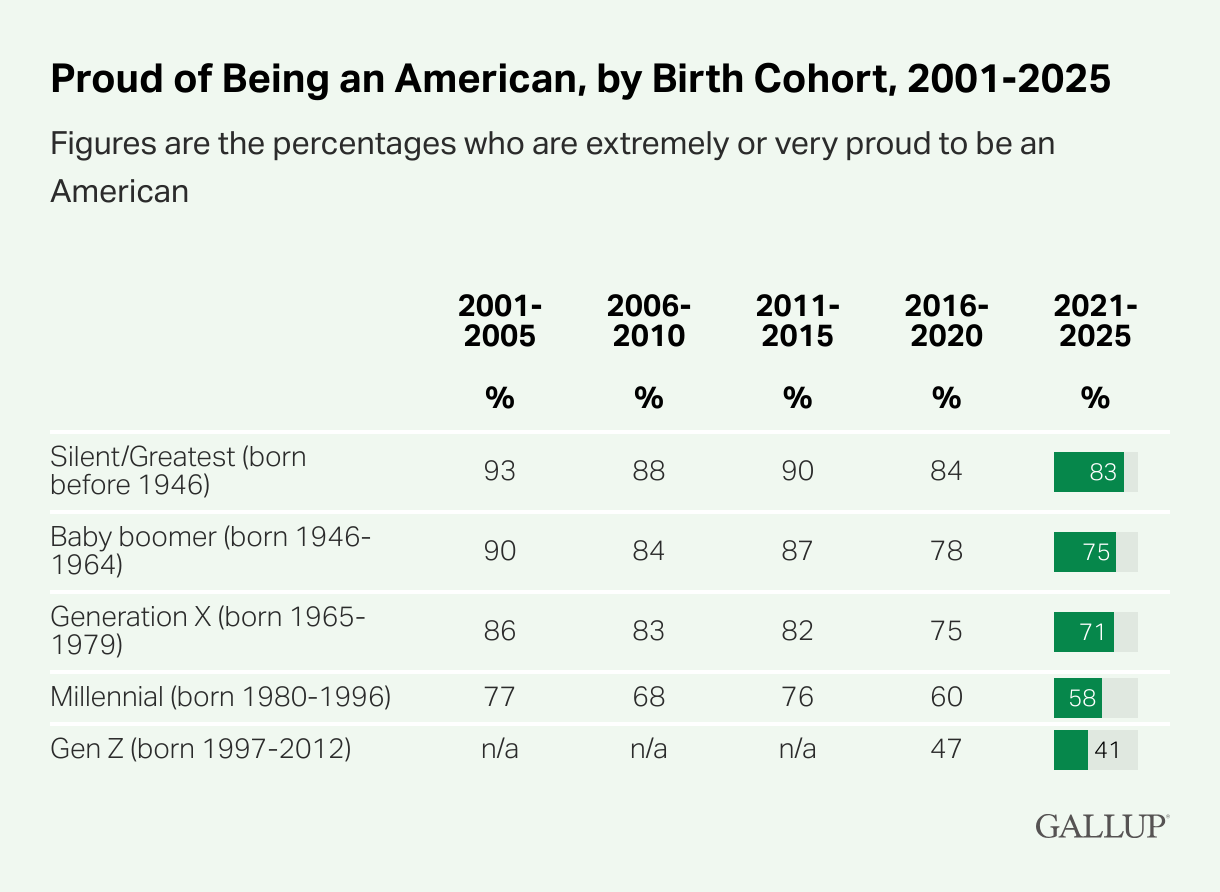How patriotic are Americans?
Critical Analysis
Find answers to the following questions using the visual above, any links below, your big brain, and your knowledge of American government and politics:
According to the data from the graph above, in 2025 what percent of Americans report that they are extremely proud to be Americans?
According to the data from the graph above, in 2001 what percent of Americans reported that they were extremely proud to be Americans?
According to the data from the graph above, what has happened to American pride over the over the past twenty four years?
A record-low 58% of U.S. adults say they are “extremely” (41%) or “very” (17%) proud to be an American, down nine percentage points from last year and five points below the prior low from 2020. Why do you think that changes has occurred?
Patriotism is a devotion to and vigorous support for one's country. Before 2015, no less than 55% of U.S. adults said they were extremely proud. The highest readings followed the 9/11 terrorist attacks, when patriotism surged in the U.S. What has happened to patriotism since 2016?
How proud are you to be an American — extremely proud, very proud, moderately proud, only a little proud, or not at all proud?
Explain what patriotism means to you and why you feel that level of patriotism?
Do you think that unity or division is more likely to build patriotism?
83% of people born before 1946 (the so called, “Greatest Generation”) are extremely or very proud to be an American. Only 41% of those born between 1997-2012 (Gen Z) feel the same. Just think about those kids born between 2010 and 2025 (Generation Alpha) and what they will say when they get asked the same question, Why do you think your generation is so much less patriotic than older generations?
According to the visual below, how does party affiliation and age/generation impact national pride?*
Write and Discuss
Take ten minutes to write about the question at the top of the page and then discuss with your classmates.
Act on your Learning
Find and old person and ask them how proud they feel to be an American. Then share your own response. Try not to beat each other up.
Get Creative
In the English language, people speak about 140 words per minute. Create a dialogue of 140 words between two people talking about their patriotism. Make one of the speakers non-patriotic and the other extremely patriotic. Here’s an example:
"The flag means everything to me," Richard declared, hand over heart. "It represents freedom, sacrifice, everything our ancestors fought for."
Jane scoffed. "Freedom? For whom, exactly? We're still grappling with systemic issues, and our 'sacrifices' often lead to conflicts we shouldn't be in. Patriotism just feels like blind loyalty."
"It's not blind! It's pride in what we can be, and gratitude for what we have. Look at our innovations, our culture, the opportunities this country offers."
"Opportunities for some, perhaps. But what about those left behind? True patriotism, to me, would be addressing those inequalities, not just waving a flag and ignoring reality. My loyalty is to humanity, not just arbitrary borders."
"But those borders define us, define our history, our unique spirit! To discard that is to discard who you are."
"I am a person, Richard, not just a citizen of a specific land. My identity isn't solely tied to a national anthem."
"Then you truly don't understand the depth of feeling. It's an honor to be part of something so much larger than yourself."
"And a responsibility to question it, to improve it, not just celebrate it unconditionally."
“I love you.”
“I love you, too.”
“Can we be friends?”
“Can we be more than friends?”
Cue The Wedding March…
Learning Extension*
Browse the Gallup Poll roundup of American views of patriotism.





